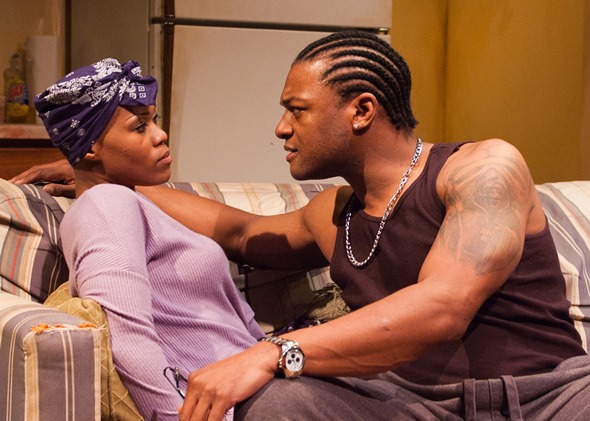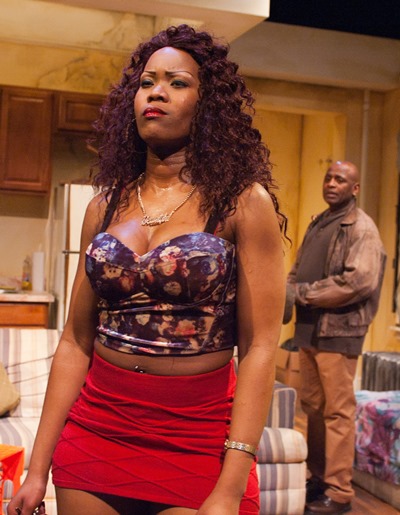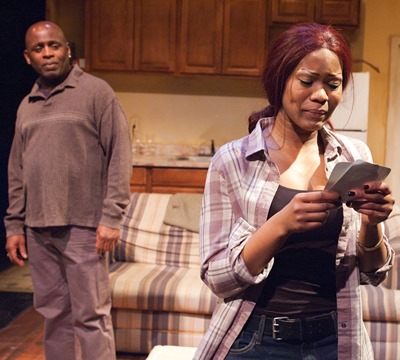‘Sunset Baby’ at TimeLine: Empty past, sordid present, fragile dreams haunt crusader’s child
 Review: “Sunset Baby” by Dominique Morisseau, at TimeLine Theatre through April 10. ★★★★
Review: “Sunset Baby” by Dominique Morisseau, at TimeLine Theatre through April 10. ★★★★
By Lawrence B. Johnson
Nina’s life is nowhere. She’s a twentysomething black girl with no real prospects, living in a dumpy apartment and attached – emotionally, financially, perhaps forcibly – to a tough but needy dude with great dreams and no solid plan. Then who should pop back into her tenuous world but her dad, she would say dad in name only, once a big player in the black power movement and recently released from prison. The old man wants something. Nina just wants him out.
That’s the setup for Dominique Morisseau’s taut, gritty, redemptive play “Sunset Baby,” much to be recommended in a blistering account directed by Ron OJ Parson at TimeLine Theatre.
 The first time we see Nina – and it’s Nina alone whom we see first – we’re looking at one hard-edged woman. Girl would be the wrong word. Hooker probably would be the right one. She’s at her dressing mirror, putting the package together for a night’s work. Some package, with minimal wrapping. Anji White inhabits this formidable babe, playing her – how can I put this – for all she’s worth. Turns out Nina is worth a lot.
The first time we see Nina – and it’s Nina alone whom we see first – we’re looking at one hard-edged woman. Girl would be the wrong word. Hooker probably would be the right one. She’s at her dressing mirror, putting the package together for a night’s work. Some package, with minimal wrapping. Anji White inhabits this formidable babe, playing her – how can I put this – for all she’s worth. Turns out Nina is worth a lot.
She’s a smart lady, or might be thought so in different attire. And why not? Her parents were bright people. Nina loves to read. She’s bilingual: speaks nuanced English when she wants to, but can turn fierce in the lingua franca (emphasis on the f) of the streets when it serves. She was in college when her mother imploded from drug abuse, so she came home to see Mom through to the end. Going back to school wasn’t in the cards. Damon was in the cards.
Damon, in the electric form of Kelvin Roston Jr., is the hardened product of a nasty scene. He deals drugs, but he’s past thirty and the rough life is starting to wear him down. He has been salting away cash, though, and he imagines the day when he and Nina will fly away from all this to another, better life. Maybe they’ll split for Europe, or South America. But somewhere. It’s going to happen.
 Damon adores Nina. Not only is he nuts about her, he really needs her. Nina is Damon’s dream-ticket. He can’t imagine life or himself or anything without her. Somehow that comes out vaguely threatening.
Damon adores Nina. Not only is he nuts about her, he really needs her. Nina is Damon’s dream-ticket. He can’t imagine life or himself or anything without her. Somehow that comes out vaguely threatening.
And then there’s pops: Nina’s father, Kenyatta, this Zen-mellow character (in Phillip Edward Van Lear’s beautifully measured performance) now materialized from the emptiness of distance and time, and the neglect of a crusader whose life was consumed by his quest. Seems he just didn’t notice little Nina. Anyway, that’s how it seems. But he and her mother were crazy about her, he says. He was so proud that he named her after the great Nina Simone, that soulful voice of black suffering. Grown-up Nina listens constantly to Simone’s aching voice on her iPod.
“Sunset Baby” is written in clashes. Nina and Damon play out a simmering relationship in which his physical dominance and insistent, pleading affection often draw pushback from Nina – until he draws a line, and she, on the safe side of caution, relents. In the finely calibrated physicality of White’s performance, it is when acquiescing Nina falls silent that her cry against fate is most piercing. But the girl’s confrontations with her father are always open warfare, albeit one-sided. She hisses at him, reviles him, and he patiently endures it all.
 Hat (and some cash) in hand, Kenyatta has come to retrieve a cache of old letters between him and his wife. Scholars want them, too, as valuable documents of a turbulent era. The letters are worth a good deal of money – as Damon soon learns. Thus a three-way struggle develops, like the Good, the Bad and the Ugly vying for buried gold. Just one of them knows where it is; the other two can only circle and wait, or maybe conduct a discreet search.
Hat (and some cash) in hand, Kenyatta has come to retrieve a cache of old letters between him and his wife. Scholars want them, too, as valuable documents of a turbulent era. The letters are worth a good deal of money – as Damon soon learns. Thus a three-way struggle develops, like the Good, the Bad and the Ugly vying for buried gold. Just one of them knows where it is; the other two can only circle and wait, or maybe conduct a discreet search.
But how is the game won, and what is the real prize anyway? With elegance and plausibility, Morisseau provides answers on both counts. And what looks like redemption may be the mirror image of a coming of a age, an unveiling of truth at a soul’s core.
Related Links:
- Performance location, dates and times: Details at TheatreinChicago.com
- Preview of TimeLine Theatre’s complete 2015-16 season: Read it at ChicagoOntheAisle.com
Tags: Anji White, Dominique Morisseau, Kelvin Roston Jr., Phillip Edward Van Lear, Ron OJ Parson, Sunset Baby, TimeLine Theatre

